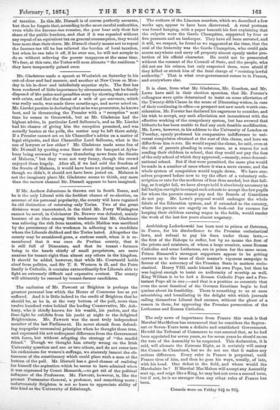It is clear, from what Mr. Gladstone, Mr. Goschen, and
Mr. Lowe have said in their election speeches, that Mr. Forster's colleagues were quite determined to insist on some alleviation of the Twenty-fifth Clause in the sense of Dissenting-wishes, in case of their continuing in office—a prospect not now much worth con- sideration. Mr. Forster has declared his eagerness to consider, and his wish to accept, any such alleviation not inconsistent with the effective working of the compulsory system, but has avowed that hitherto he has been unable to find any such feasible modification. Mr. Lowe, however, in his address to the University of London on Tuesday, openly professed his comparative indifference to uni- versal compulsion obtained at the cost of this clause, and here we differ from him in toto. He would repeal the clause, he said, even at the risk of parents pleading in some cases, as a reason for not sending their children to school, that they could not pay the fees of the only school of which they approved, —namely, some denomi- national school. But if that were permitted, the same plea would be made in a number of cases where it was a mere excuse, and the whole system of compulsion would topple down. We have our- selves proposed before now to try the effect of a voluntary sub- scription or rate for the modicum of fees thus needed, but that fail- ing, as it might fail, we have always held it absolutely necessary to fall back:on our right to compel such schools to accept the fewpupils for whom the parents cannot pay and the Boards of Guardians do not pay. Mr. Lowe's proposal would endanger the whole fabric of the Education system, and if extended to the country, where the parents are eagerly on the look-out for excuses for keeping their children earning wages in the fields, would render the work of the last few years almost nugatory.


































 Previous page
Previous page